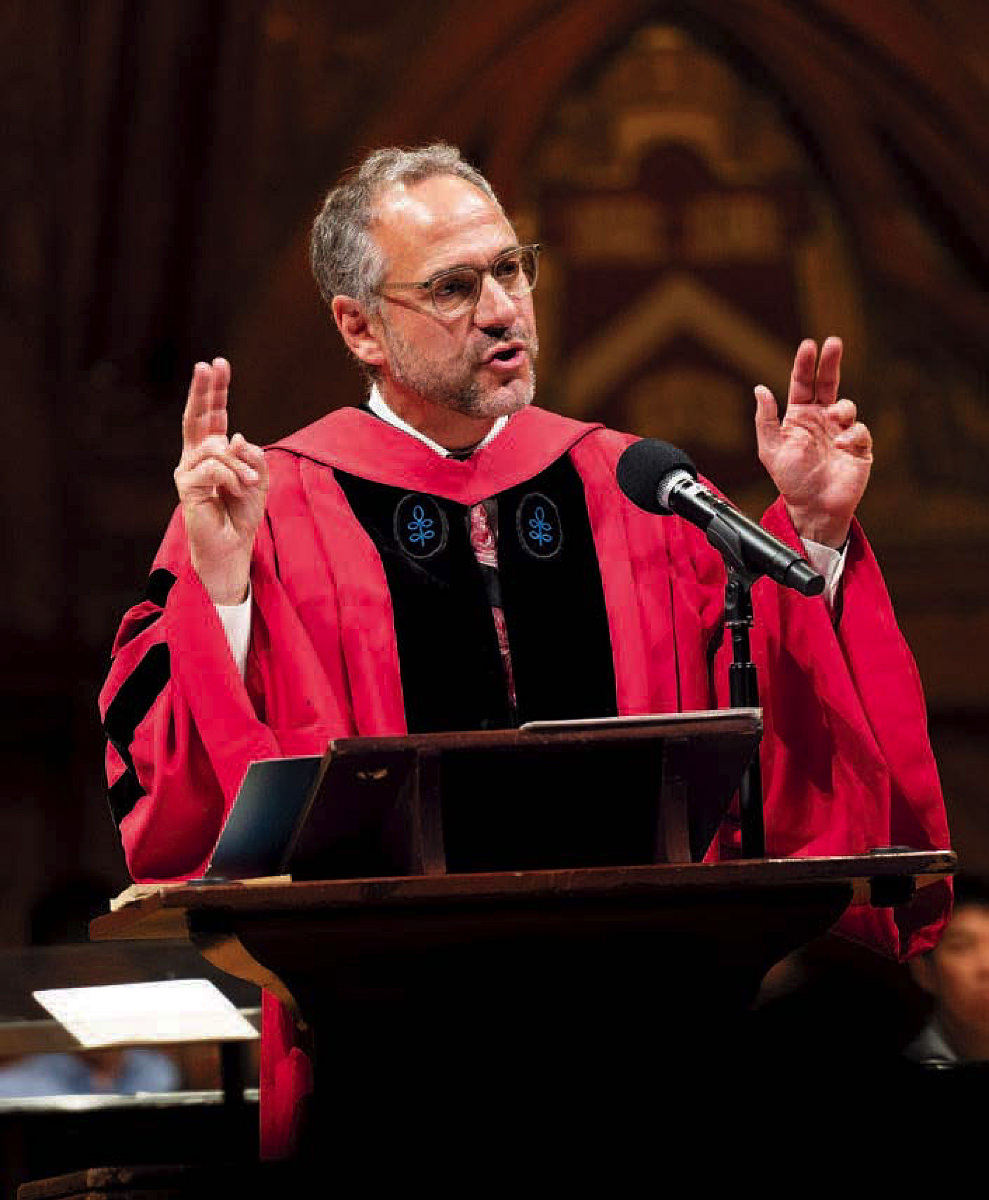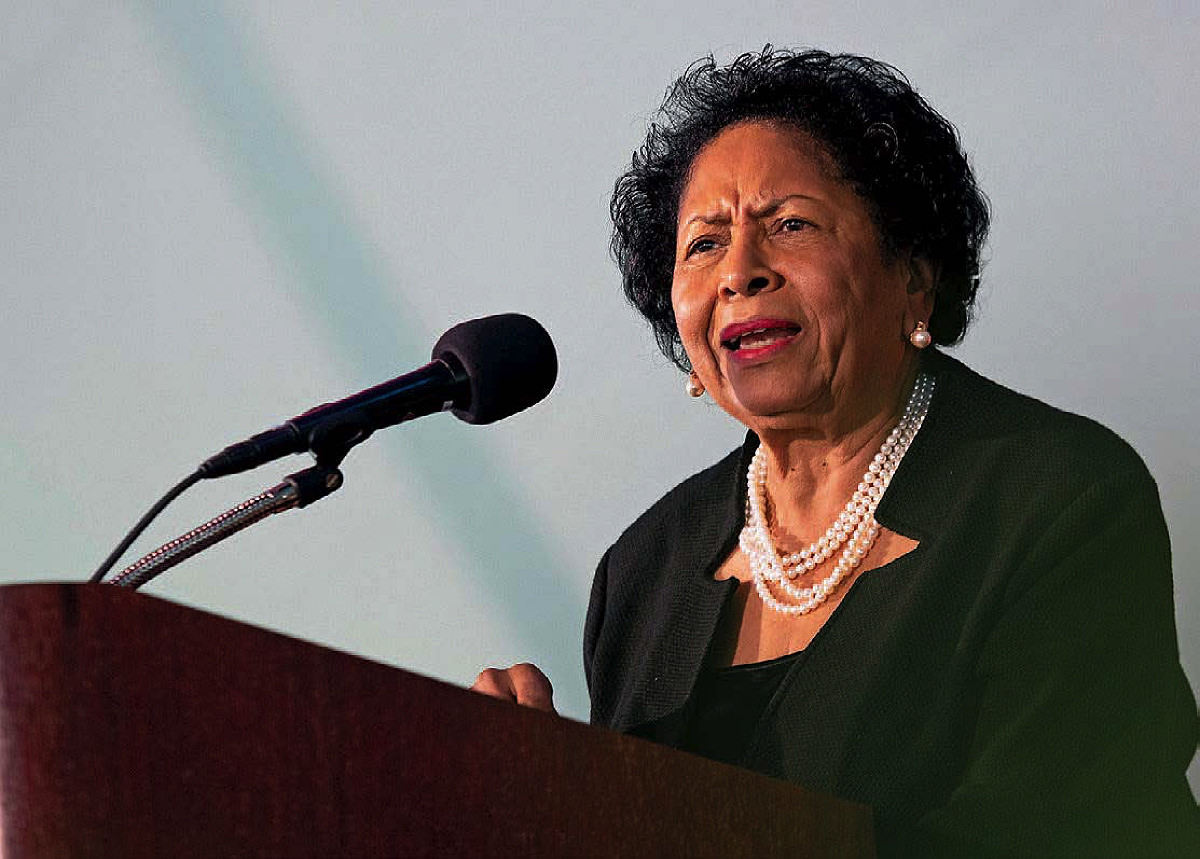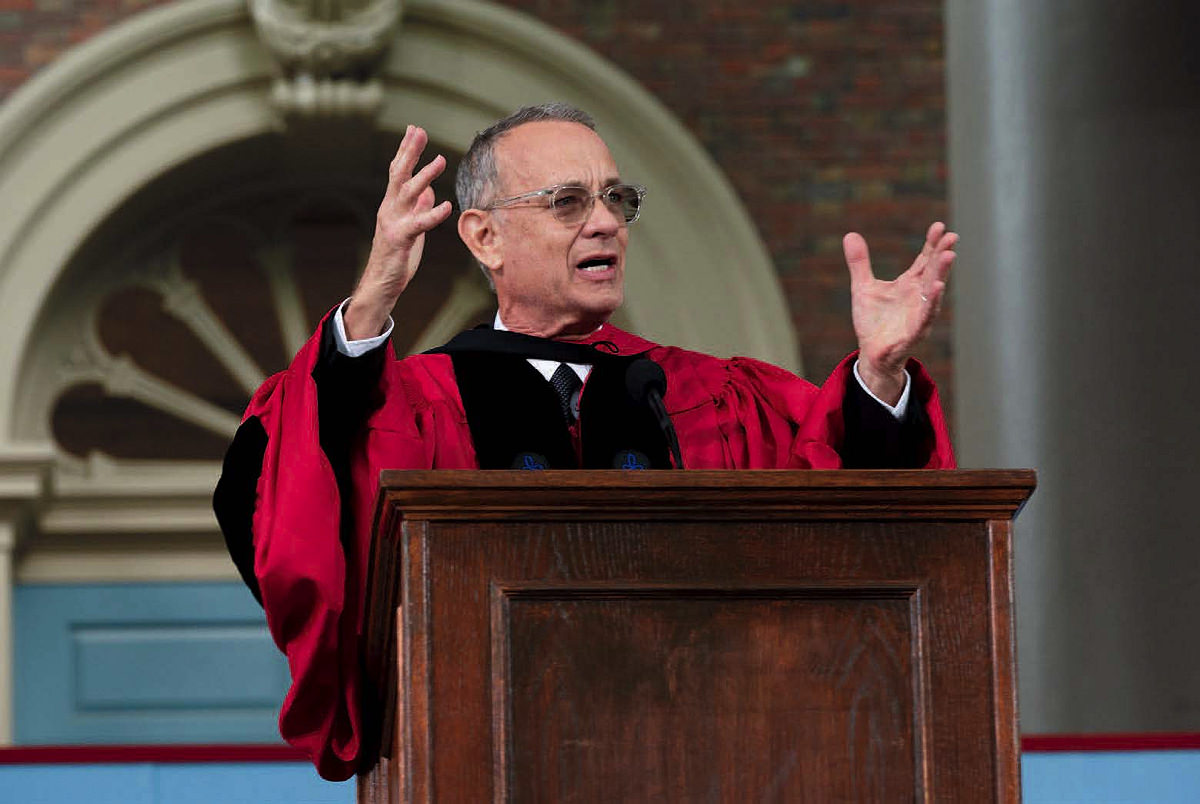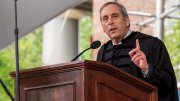“Get Out of Your Own Way”
Imparting life lessons to the seniors in his final baccalaureate address, on May 23, President Lawrence S. Bacow drew upon his own experiences in academia.
I learned that a career is only knowable in retrospect.…I came here expecting to be a lawyer. I left here a committed academic. My time as a student helped me understand that there are many ways of knowing and understanding the world beyond the study of law. And my time as president has only reinforced this view. I have spent hundreds of hours talking to faculty and reading their work over the past five years. For me, this has actually been an intellectual feast, in many ways an extension of my time as a graduate student. I hope that Harvard has also stoked your own curiosity, and, like me, you have learned that learning is a lifetime endeavor.…
I learned that regardless of one’s title—even as the president of Harvard—there is no way, no way, that you can know everything. No matter what your position, whether you are in your first job or, like me, your last, it is OK to say, “I don’t know.” And to do so is not a sign that you are weak; it is a sign that you…have the confidence to seek out others who know more than you.…
[D]uring the pandemic, I learned that I needed the advice and counsel of those who knew far more about the complexities of decisions that…were completely foreign to me. I knew nothing about infectious diseases, other than having had a few of them myself. I knew nothing about epidemiology, virology, or public health. Had I made important decisions without the benefit of counsel from those who are experts in these fields, I would have been guilty of presidential malpractice.…
I have learned how important it is to get out of your own way. A little more than five years ago, I was, very happily, a semi-retired university president enjoying my freedom, my life, my privacy, the ability to do things spontaneously….Someone suggested that perhaps I should consider this job. And I literally looked in the mirror—and what did I see? I did not see the president of Harvard. I thought my hair wasn’t gray enough (it’s gotten grayer). I thought my voice was not deep enough. I thought that my presence was not serious enough….And, if I’m really being honest, I thought I just wasn’t tall enough. In short, in my mind, I was not the image of what a Harvard president ought to be.….
Enter Adele, my wife of almost 48 years.…She said, “Just be yourself; and if you do that, you’ll be fine.”…So, once she said that, I actually stopped looking in the mirror, I got out of my own way, and here I am, standing before you—giving you the last advice I will ever give to a Harvard College class again.
“A Notion Favored by Authoritarians”
Phi Beta Kappa Orator Adam Falk, Ph.D. ’91, detailed the context of academic freedom and the First Amendment protections accorded to free speech, and then outlined recent developments in Florida: an attempt to prohibit political science faculty members from testifying in a voting-rights suit; the Stop WOKE Act’s constraints on classroom discussion; and the replacement of several trustees of a public college and the subsequent dismissal of the president. He continued:
The extraordinary claim that lies at the heart of all three of these cases is that the loyalty of faculty must be to the state, and the state may decide what they are permitted to say in the classroom and the courtroom. There is perhaps no idea more antithetical to academic freedom, or to the academy itself. It is certainly a notion favored by history’s authoritarians.
 Adam FalkPhotograph by Jim Harrison
Adam FalkPhotograph by Jim HarrisonWhich brings me back to my father’s story. In January of 1933, Adolf Hitler’s National Socialists were elected as a minority government in Germany. At the time, my father was a young professor at the German School for Politics in Berlin, heading a subunit called the Trade Union School, a three-year course for young trade unionists to study economics, law, and politics. In March, over spring break, he traveled to Austria, and while he was gone, there came the Reichstag fire, the banning of other parties, and the establishment of the dictatorship. My father understood that the Nazis would not allow independent academic institutions to persist, that in fact the notion of an independent academic institution was anathema to their conception of the role of the state in society. He never returned to Germany. And by the end of 1933, Joseph Goebbels—Hitler’s newly appointed Reich Minister of Public Enlightenment and Propaganda—had purged and Nazified the German School for Politics. The only faculty who remained were those who were prepared to serve as voices of the Nazi state.
My father’s story is a chilling reminder of the importance of academic freedom and a reminder that the destruction of a society’s political freedoms often starts by targeting the universities. Academia, as an institution, is a bulwark against the idea that the state can decide what is acceptable to say, write, and even think.
“The Attack upon Educators”
Ruth Simmons, Ph.D. ’73, LL.D.’02—another educator—sought to support the teachers and superintendents of the future during her Graduate School of Education class day speech on May 24.
As those committed to leveling the playing field, we find ourselves under attack for the basic tenet that…everyone should have access to learning that enables them to live better and more fulfilling lives. More and more, public figures feel secure in advocating for an end to the ideal of equal access. The principle that providing for those least able to advocate for themselves makes us stronger as a nation has given way, it seems, to the thought that only certain elites should avail themselves of the best that we can provide. The contempt for and inhumane treatment of vulnerable populations has garnered a surprising degree of support, making it challenging to secure the funding needed to educate those populations.

Ruth SimmonsPhotograph courtesy of Harvard Graduate School of Education
The attack upon educators is a means to achieving fundamentally base aims.…The way to upend the influence of educators is to call into question their qualifications to play such an important role. Parents, religious groups, and public officials, they argue, should have the strongest voice in shaping the education of young people. While debate is healthy and the involvement of communities in the educational mix is welcome, undermining the most knowledgeable and expert educators in the task of building learning communities is misguided and unwise.
Recalling the teachers and educators who helped her overcome the “dystopian” experience of growing up in the Jim Crow South, she continued:
I am amazed even today to recall how hopeful they seemed in the face of overwhelming circumstances. As a lifelong educator, I can understand how their calling imbued in them a hopefulness that could not be stanched by signs of danger ahead. Those of us drawn to education invariably believe that by assuring people’s ability to evolve through learning, we will always have a way out of madness. We believe that by enlightening others, we have an opportunity to shape a common understanding of our humanity.
“Truth, Justice, and the American Way”
From the Commencement address by Tom Hanks, Ar. D. ’23:
[W]e’d like to look up in the sky and see not a bird, not a plane, but, well, someone who’s young, strong, and super, who’ll fight the never-ending battle for Truth, for Justice, and for the American way—someone who will take on that work.…
That work is the keeping of the promises of our promised land, the practice of decency, the protection of freedom, and the promotion of liberty for all—with no exceptions.…The American Way can be exampled when you respect the law and the rights of all, because if you don’t, who will? When your food is brought to you and you thank the server, because if you don’t, who will? When you pick up the litter that missed the recycling bin, because if you don’t, who will? When you vote your conscience and make sure your neighbor has the opportunity to do the same with theirs, because if you don’t, who will? When you make good on your victories and learn from your losses, because if you don’t, who will?

…[But] Indifference will rust away the promise of our promised land. Propaganda and Bald-faced Lies will erode over time. Idolatry and Imagery lose luster and effect over time. Ignorance and Intolerance can be replaced by experience in the wink of an eye. But Indifference will narrow the vision of America’s people and make dim the light of Lady Liberty’s symbolic torch. Indifference makes citizens into indentured servants held in labor by the despots and tyrants…surging into the vacuum caused by the Indifference of a people who have been made weary by struggle, so weary that they lose hope and are left to yearn to be saved by the fiction of superheroes.
Every day, every year, and for every graduating class, there is a choice to be made, the same option for all grownups: to be one of three types of Americans—those who embrace liberty and freedom for all, those who won’t, or those who are indifferent. Only the first do the work of creating a more perfect union, a nation indivisible. The rest just get in the way. In the never-ending battle you have all officially joined as of today, the difference is in how truly you believe, in how vociferously you promote, in how tightly you hold to the Truth that is self-evident—that of course we are all created equally yet differently, and of course we are all in this together. If we do the work together, Justice and the American way are within our grasp no matter our gender, our faith, our station, our heritage, our genetic makeup, the shade and hue of our flesh, or the continental birthplace of our ancestors. Why is that truth so hard for some to accept—much less respect? If you live in the United States of America, the responsibility is yours, ours. The effort is optional.…None of us are super…we are all but human.









